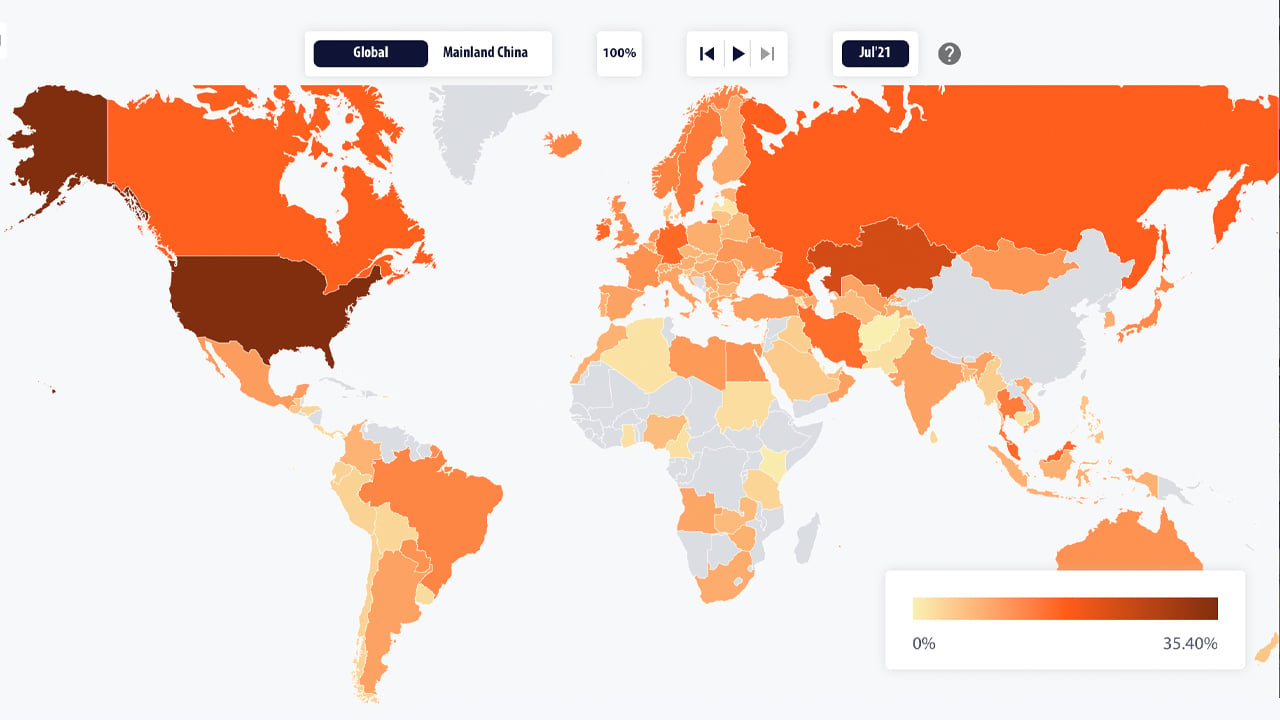 After China has reigned for a number of consecutive years as the dominant bitcoin mining epicenter of the world, the United States has “taken the leading position in bitcoin mining,” according to new data from Cambridge University. Data Shows US, Kazakhstan, Russian Federation Rule the Bitcoin Mining Roost In mid-July, researchers from the Cambridge Bitcoin […]
After China has reigned for a number of consecutive years as the dominant bitcoin mining epicenter of the world, the United States has “taken the leading position in bitcoin mining,” according to new data from Cambridge University. Data Shows US, Kazakhstan, Russian Federation Rule the Bitcoin Mining Roost In mid-July, researchers from the Cambridge Bitcoin […] Regional reports from China indicate that government officials have been reviewing over 5,100 small-sized hydropower plants in order to get them to adapt to China’s cleanup and rectification process concerning future energy sources. China has pledged to be carbon neutral and ultimately have zero carbon emissions by 2060 and the recent crackdowns on bitcoin miners […]
Regional reports from China indicate that government officials have been reviewing over 5,100 small-sized hydropower plants in order to get them to adapt to China’s cleanup and rectification process concerning future energy sources. China has pledged to be carbon neutral and ultimately have zero carbon emissions by 2060 and the recent crackdowns on bitcoin miners […] After the researchers from the Cambridge Bitcoin Electricity Consumption Index (CBECI) project said that the website’s “Bitcoin Mining Map” had not been updated since April 2020, the map has finally been updated. Current data from the mining map shows the coverage goes all the way up until April 2021, and the estimate of China’s hashrate […]
After the researchers from the Cambridge Bitcoin Electricity Consumption Index (CBECI) project said that the website’s “Bitcoin Mining Map” had not been updated since April 2020, the map has finally been updated. Current data from the mining map shows the coverage goes all the way up until April 2021, and the estimate of China’s hashrate […] Most of the crypto community has been focused on the developments in China and more specifically, the crackdowns against bitcoin miners in Inner Mongolia, Xinjiang, Qinghai, Yunnan, and Sichuan. On Wednesday morning (EST), Bitcoin’s overall hashrate has continued to drop and is now below the 100 exahash per second (EH/s) region. During the last 24 […]
Most of the crypto community has been focused on the developments in China and more specifically, the crackdowns against bitcoin miners in Inner Mongolia, Xinjiang, Qinghai, Yunnan, and Sichuan. On Wednesday morning (EST), Bitcoin’s overall hashrate has continued to drop and is now below the 100 exahash per second (EH/s) region. During the last 24 […] The hashrate of the Bitcoin network has been steadily falling since June 14 and after Sichuan miners were told to prepare operation shutdowns. Sichuan is the second-densest province in China where most miners are located, according to data stemming from the University of Cambridge. Bitcoin’s hashrate is now hovering just above 100 exahash per second […]
The hashrate of the Bitcoin network has been steadily falling since June 14 and after Sichuan miners were told to prepare operation shutdowns. Sichuan is the second-densest province in China where most miners are located, according to data stemming from the University of Cambridge. Bitcoin’s hashrate is now hovering just above 100 exahash per second […] Authorities in Yunnan are launching an investigation to identify and shut down miners that are illegally using electrical power to mint bitcoin, Chinese media reports. Inspections will also focus on potential safety hazards and will be carried out by various government departments. The mining industry cleanup is expected to continue till the end of June. […]
Authorities in Yunnan are launching an investigation to identify and shut down miners that are illegally using electrical power to mint bitcoin, Chinese media reports. Inspections will also focus on potential safety hazards and will be carried out by various government departments. The mining industry cleanup is expected to continue till the end of June. […]
Xinjiang crypto miners forced to shut down, Antpool hash rates drop by 30%, and Baidu and Weibo try to scrub crypto players from their platforms.
This weekly roundup of news from Mainland China, Taiwan, and Hong Kong attempts to curate the industry’s most important news, including influential projects, changes in the regulatory landscape, and enterprise blockchain integrations.
This week, following a tumultuous few weeks of regulation, the Bitcoin world’s focus shifted to Miami and Latin America. Searches for Bitcoin on China’s most popular social media app WeChat stabilized between 1-3 million per day, a stark difference from the peaks of over 10 million that were seen in late May.
Baidu, China’s dominant search engine, restricted searches for exchanges Binance, Huobi, and OKEx early in the week. Typically, large internet companies work under the watchful eye of government and party officials, making this move somewhat expected. Filtering out keywords isn’t always the most effective solution, as searches for “Binance App Download” would still take users to the requested link. It’s worth pointing out that the government has limited authority in these cases since most of these big exchanges, particularly Binance, are registered in other countries and have a limited physical presence in China.
More effective was the silencing of cryptocurrency influencer accounts on micro-blogging platform Weibo. According to reports in Cointelegraph, at least a dozen accounts were suspended with a message that they had violated relevant laws and guidelines. This can have a much more sobering impact on the Chinese cryptocurrency community as influencers are often a primary source of information, especially for users who don’t access traditional western social media platforms.
On June 9, a district government in western Xinjiang issued a "notice to immediately suspend virtual currency mining enterprises." The report announced that companies engaged in digital currency mining must halt production by 2PM on June 9 and report the suspension to a local reform commission. This resulted in significant drops in global hashing power, with Chinese-backed Ant Pool dropping by more than 30%. The last month has seen a bevy of regulations against mining companies as China prepares to try and meet carbon emissions goals. Miners are still scrambling to adjust to new regulations with many heading to more lenient countries like neighboring Kazakhstan.
The Monetary Authority of Singapore announced it has received over 300 applications for crypto payments and exchange licenses. Singapore is a common location for Chinese companies to domicile as it is home to a thriving FinTech sector but remains close to the mainland, both in terms of geography and cultural ties. One of the companies disclosed was internet giant Alibaba. Alibaba has come under the microscope back in China for it lending practices, so it’s no surprise that Alibaba and other Chinese companies might want to diversify their financial offerings in other regulatory regions.
On June 7, China’s high-ranking Ministry of Industry and Information Technology issued guidelines on accelerating the application of blockchain technology in the industrial sector. It targeted 2025 as the year that blockchain should penetrate fields such as supply chain management and traceability for internationally competitive enterprises. This will be of interest to a number of public and private chains that are able to develop within the confines of the Chinese regulatory framework. Despite cryptocurrency facing strong backlash, the Chinese government hasn’t backed down from its hopes for blockchain to be a driver of economic growth in the country.
For those looking to better understand China’s ambitions in this area, government-backed BSN hosted a webinar about China’s pursuits in emerging technologies. China technology experts Winston Ma and Paul Schulte covered a number of topics including blockchain, central bank digital currencies and even some more controversial geo-political issues. Cointelegraph’s Man in Shanghai himself was on hand to moderate, keeping an unbiased eye on things.
On June 8, the Hong Kong Monetary Authority released a "Fintech 2025" strategy to enhance research on a central bank digital currency. The Hong Kong Monetary Authority is working with the Innovation Hub of the National Bank for Settling and Clearing to bring a central bank digital currency to the retail level. This area is an interesting space to watch to determine how the e-HKD will be similar to the e-CNY, and what that means for the financial future of the region.
 Following the report that indicates specific Chinese miners in the Xinjiang region were told by officials to shut down, another agency in Qinghai has informed miners to cease operations in a recently published government mandate. Similarly, the Qinghai Industry and Information Technology Department’s document explains bitcoin mining operations cannot operate in the area. Qinghai Province […]
Following the report that indicates specific Chinese miners in the Xinjiang region were told by officials to shut down, another agency in Qinghai has informed miners to cease operations in a recently published government mandate. Similarly, the Qinghai Industry and Information Technology Department’s document explains bitcoin mining operations cannot operate in the area. Qinghai Province […] An official notice stemming from the Changji prefecture government in Xinjiang details that officials from the Zhundong Economic-Technological Development Park must instruct bitcoin miners to shut down. China’s province of Xinjiang is a highly concentrated region of bitcoin miners and bitcoin activities at the park must cease by June 9, according to the document. Nevertheless, […]
An official notice stemming from the Changji prefecture government in Xinjiang details that officials from the Zhundong Economic-Technological Development Park must instruct bitcoin miners to shut down. China’s province of Xinjiang is a highly concentrated region of bitcoin miners and bitcoin activities at the park must cease by June 9, according to the document. Nevertheless, […]